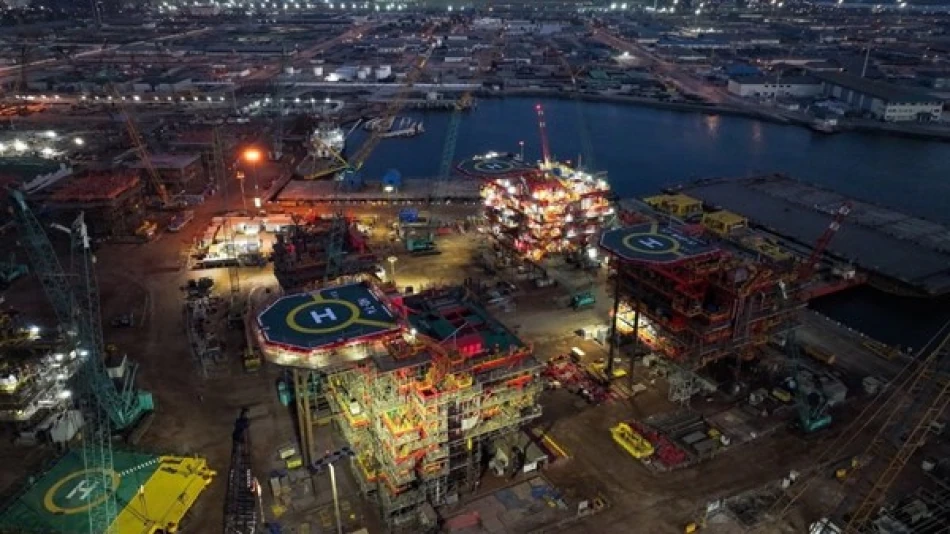
NMDC Energy's Profits Soar 16% in First Half, Showcasing Robust Growth Trajectory.
NMDC Energy Delivers 41% Revenue Surge as Saudi Manufacturing Hub Powers Regional Expansion
Abu Dhabi-based NMDC Energy has posted impressive first-half 2025 results, with revenues jumping 41% to AED 8.2 billion and net profits climbing 16% to AED 583 million. The energy services giant's performance reflects a broader trend of Gulf contractors capitalizing on the region's massive infrastructure spending, particularly as Saudi Arabia's Vision 2030 and the UAE's industrial diversification plans fuel unprecedented demand for engineering and manufacturing services.
Financial Performance Signals Market Leadership
NMDC Energy's financial metrics reveal a company hitting its stride in a booming regional market. The 41% revenue growth significantly outpaces industry averages, while the 16% increase in net profits demonstrates operational efficiency amid expansion. Second-quarter results maintained momentum with revenues up 21% year-on-year to AED 4.4 billion and net profits rising 12% to AED 366 million.
These numbers become more impressive when viewed against the company's project pipeline. With AED 13.9 billion in new contracts secured during the first half and a backlog of AED 49.9 billion in ongoing projects, NMDC Energy has positioned itself to sustain growth well into 2026 and beyond.
Saudi Manufacturing Hub: A Strategic Game-Changer
The full operationalization of NMDC Energy's 400,000-square-meter manufacturing facility in Ras Al Khair, Saudi Arabia, represents more than just capacity expansion—it's a strategic pivot that could reshape the company's competitive position across the Gulf.
Geographic Diversification Reduces Risk
By establishing significant manufacturing capabilities in Saudi Arabia, NMDC Energy has effectively hedged against economic fluctuations in any single Gulf market. This mirrors successful strategies employed by other regional contractors like Petrofac and Tecnicas Reunidas, who have built cross-border operational networks to capture opportunities across multiple national development programs.
The timing appears optimal. Saudi Arabia's Public Investment Fund is deploying hundreds of billions of dollars into NEOM, the Red Sea Project, and industrial cities, creating sustained demand for exactly the type of engineering, procurement, and construction services NMDC Energy provides.
Market Positioning in a Competitive Landscape
NMDC Energy's expansion comes as Gulf governments increasingly prioritize local content requirements and supply chain localization. The company's manufacturing capabilities position it favorably for contracts that require significant in-region production, potentially offering competitive advantages over international contractors who rely on imported components.
This strategy aligns with broader economic nationalism trends across the Gulf, where countries are leveraging oil revenues to build domestic industrial capacity rather than simply importing finished goods and services.
Investor and Market Implications
For investors, NMDC Energy's results suggest the company has successfully navigated the transition from a primarily UAE-focused contractor to a regional player. The AED 66 billion in projects under award consideration indicates robust future revenue visibility, though execution risk remains a key factor to monitor.
The energy services sector has historically been cyclical, but the current Gulf infrastructure boom appears more sustainable than previous cycles due to its foundation in long-term economic diversification rather than short-term commodity price spikes.
Strategic Outlook: Building Industrial Self-Sufficiency
Chairman Mohamed Hamd Al Mehiri emphasized the company's role in building regional industrial capabilities, while CEO Ahmed Salem Al Dhaheri highlighted the development of local partnerships and expanded manufacturing capacity. These statements suggest NMDC Energy views itself as more than a contractor—it's positioning as a cornerstone of Gulf industrial development.
This positioning could prove prescient as Gulf states increasingly seek to capture more value from their energy resources through downstream processing and manufacturing, rather than simply exporting crude oil and importing finished products.
The company's ability to execute complex engineering, procurement, and construction projects at scale and speed will likely determine whether it can sustain its current growth trajectory as regional competition intensifies and project complexity increases.
Most Viewed News

 Layla Al Mansoori
Layla Al Mansoori






